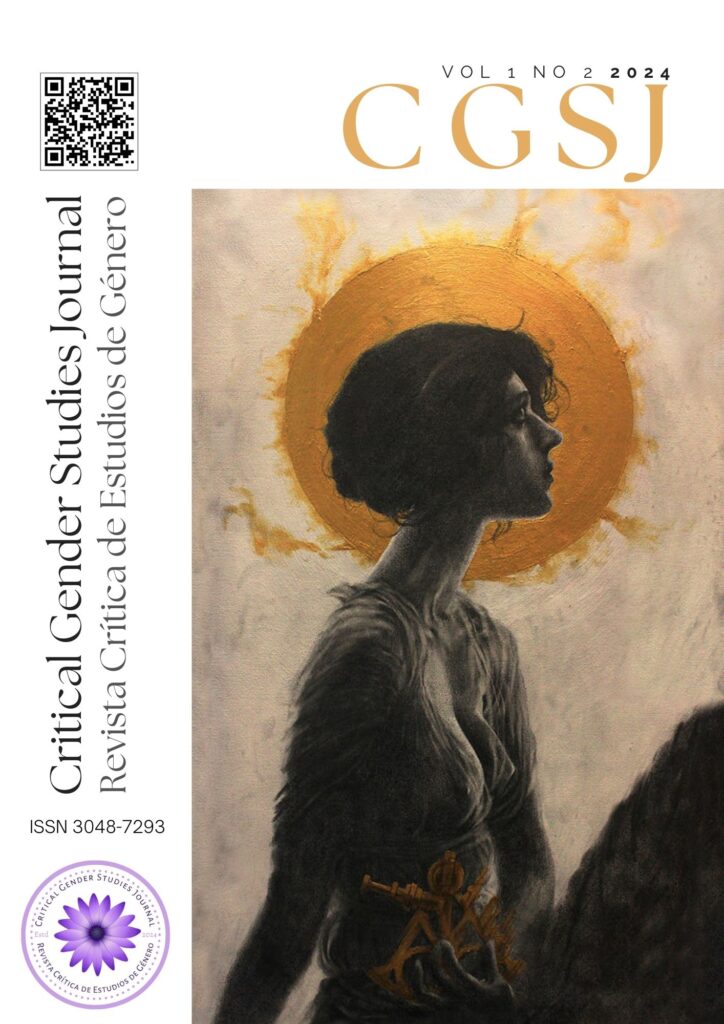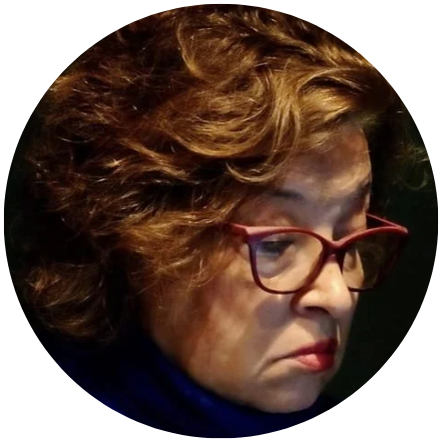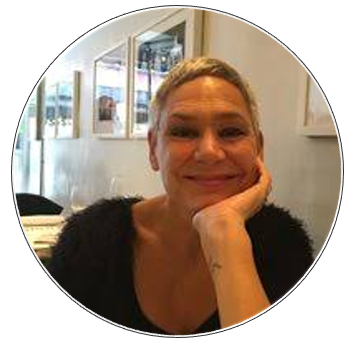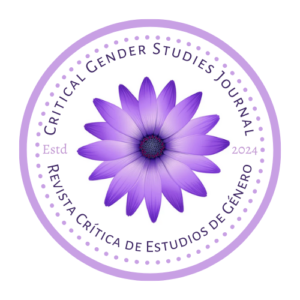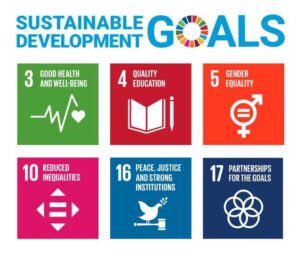Book Review and a Conversation with the Author
In (M)other Words: Writings on Mothering and Motherhood, 2009-2024 by Andrea O’Reilly
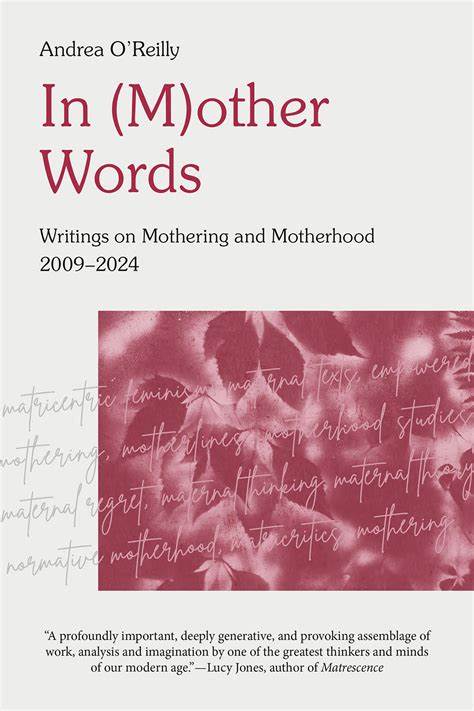
Demeter Press, May 2024, pp. 533, ISBN: 978-1-77258-527-8.
Review and Interview by
Veronica Frigeni
Visiting Scholar in Residence in Gender Studies, Central European University.
| Funding: No funding was received for this research and publication. Conflicts of Interest: The author declared no conflicts of interest. History: Received: 18 November, 2024. Published: 28 December 2024. Copyright: © 2024 by the author/s. License: Critical Gender Studies Network (CGSN), India. Distributed under the terms and conditions of the Creative Commons Attribution (CC BY) license (https://creativecommons.org/licenses/by/4.0/). Published by: Critical Gender Studies Network (CGSN) Citation: Frigeni, V. (2024). Book Review and a Conversation with the Author: In (M)other Words: Writings on Mothering and Motherhood, 2009-2024 by Andrea O’Reilly. Critical Gender Studies Journal. 1:2. DOI: https://doi.org/10.21659/cgsj.v1n2.01r |
The Review
Andrea O’Reilly’s anthology, In (M)other Words: Writings on Mothering and Motherhood, 2009-2024, stands as a landmark contribution to the field of maternal scholarship, offering a comprehensive examination that spans a quarter-century of thought and discourse. Comprising twenty-five meticulously selected essays, this anthology navigates the intricate terrain of maternal theory, praxis, identity and representation with nuanced sophistication. O’Reilly adeptly orchestrates a discourse that traverses a diverse spectrum of themes, from the theoretical underpinnings of motherhood studies, maternal theory, matricentric feminism and matricritics, to the lived experiences of mothering, including outlaw, queer, pandemic, ambivalent and joyful mothers. These themes emerge as the guiding leitmotifs in her anthology, capturing crucial moments in her dialectical articulation of the emergence of motherhood as a scholarly inquiry, where recuperation and revolution of motherhood intersect, illuminating the transformative potential of maternal agency amidst patriarchal hegemonies. Throughout the book, O’Reilly engages in dialogues with scholars and practitioners from around the world, offering insights gleaned from interviews and collaborative endeavours in the context of matrilineal and mothering solidarity.
Notably, the book begins and ends with two thought-provoking interviews, which serve to contextualise and frame the collection as part of a dynamic dialogue that encourages readers to engage with its content in a personal and interactive manner. The first interview, conducted by Zita Kārkla in Latvia, in 2024, offers insight into O’Reilly’s reflections on matricentric feminism, as well as on the trajectory of motherhood studies over the past decades. This introductory conversation sets the stage for the subsequent, rich and multifaceted exploration, providing valuable insights into the author’s motivations and perspectives. Furthermore, as the last piece to be composed, it gives a reflective bookend to the entire collection. This provides O’Reilly with a chance to revisit and expand upon key themes and insights, leaving readers with a renewed sense of purpose in their own explorations of motherhood and feminism. The concluding essay features a thought-provoking conversation with Sara Ruddick from 2009, prompting readers to reflect on maternal thinking and mothering as a verb, as a form of work, rather than as an identity. These dialogues serve to elucidate the nuances of key issues pertaining to motherhood and mothering, and their contemporary relevance to maternal and feminist thought and activism. Moreover, they reveal how articulating and examining mothering words is an embodied effort which directly speaks to one’s lived experiences and subject positionalities.
At the heart of O’Reilly’s theoretical framework lies the foundational feminist principle that “the personal is political,” which deeply influences the thematic fabric of the anthology. This principle underscores the idea that personal experiences are inherently intertwined with broader socio-political dynamics. In the context of motherhood, it sheds light on two key aspects. Firstly, it reveals how personal experiences of motherhood are often subjected to unequal power dynamics. Secondly, it emphasizes the importance of examining a diverse array of individual experiences, rather than essentializing them, in order to understand the social and political power wielded by mothers.
One of the book’s strengths lies in its intersectional approach, which acknowledges the diverse experiences of mothers across race, class, age, sexuality, and other social dimensions. O’Reilly’s exploration of African American mothering, for example, illuminates the resilience and resistance embedded within maternal practices in marginalised communities. Similarly, O’Reilly is cognisant of the gendered nature of motherhood and the ways in which societal norms and expectations shape maternal experiences. She navigates this complexity by employing a language that is both inclusive and sensitive to the gendered realities of mothering. This entails acknowledging the distinctive challenges confronted by women who mother as a marginalised group, while also acknowledging the diversity of experiences within motherhood, including those of non-binary and trans parents. By striking this balance, O’Reilly ensures that her anthology is accessible and relatable to a wide range of readers while also remaining attuned to the specific gendered dynamics at play within the realm of motherhood. This nuanced approach allows her to create a space where mothers feel seen, heard, and understood, while also inviting critical reflection on the ways in which gender shapes our understanding of maternal experiences.
It is my opinion that O’Reilly’s writing represents an intricate textual configuration, resonating with Walter Benjamin’s notion of constellations as a multitude of points collectively forming a discernible yet contingent and transient pattern. In The Origin of German Tragic Drama, Benjamin proposes that “ideas are to objects as constellations are to stars” (1985, p. 34), to imply that, in a manner analogous to the perception of constellations, they facilitate the comprehension of relationships between cultural objects and socio-political phenomena. This is a suggestion that I think O’Reilly’s anthology invites readers to engage with through its non-linear thematic organisation around motherhood as institution, practice, subjectivity and representation. This is why the reading of In (M)other Words is not a linear process; rather, it is a temporality of interruption, iteration, and backwards meditation, mingled with present activism and future desire. The text beckons readers to engage with it as a dynamic projectuality, where each encounter with a fragment opens up new pathways of understanding and interpretation.
In summation, In (M)other Words emerges as a seminal text within the field of motherhood studies, offering a sophisticated and thought-provoking exploration of maternal theory, praxis, and representation. Whether one is an academic scholar, activist, or lay reader, O’Reilly’s anthology constitutes an indispensable resource for engaging with the complexities and nuances of motherhood in the twenty-first century.
The Conversation with Andrea O’Reilly
In the book, a tension is present, although it does not paralyse ‒ it works to clear the ground and it turns into a call to action. As O’Reilly observes, “as I reflect on the triumphs and tribulations of feminist mothering, I question whether my research and that of feminist scholarship on motherhood more generally have truly and fully actualized Demeter’s maternal power and fury” (169). It is from this perspective that I initiate my dialogue with her.
1. What defines Demeter’s maternal power and fury, and how can scholars of motherhood further efforts to realize it?
I discovered the Goddess when I was a young woman. I’ve always had a fascination with Greek mythology long before I was a mother. And I was always awed and amazed by Demeter’s narrative. And then of course, when I became a motherhood scholar and, in 2006, founded a press dedicated to motherhood studies, I, of course, had to name it in her honour: Demeter Press.
I believe Adrienne Rich brought Demeter to the attention of motherhood scholars who may not have been familiar with Greek mythology. She became an icon, a symbol, a trope in motherhood studies. Rich talks about the power of Demeter. And it’s something that is so rare in patriarchal cultures, in life or literature, to have an image and a narrative of a mother woman who says, basically, “No, I’m not going to do that. I’m angry and I’m pissed off and you’re going to see my rage”. Women, as we know, are not allowed to be angry and act upon anger, and particularly not mothers.
That is one of the ultimate taboos of mothering, is to be an enraged mother. I really think it’s a power that is breathtaking as she actually stands up to the Head God and says, “No, I am not going to have the seasons come. I’m not going to have spring arrive and produce a harvest until you return my daughter to me”. And I think that resonates with so many women because we have so few resources as mothers to stand up, to talk back, to resist. And I think that’s why Adrienne Rich honored, celebrated and circulated that image of this enraged mother, to show how much rage can empower, how much rage can result in resistance. And yes, I know it is often more complicated than that. But I think it’s a trope or a symbol. It’s very empowering, very energizing. Now, how do we enact this in real life? Well, many, many books have been written on that. But it is a trope that keeps circulating in motherhood studies decades after Rich’s book. When I share the story with my students it is often a revelation. In Canada, many students don’t know about Greek mythology. I’m not sure how they got a high school diploma without knowing that but I share that story to them. And they are really impressed to go, wow, like I didn’t know about. And then, there’s a lot more about Demeter’s mysteries and the secrecy of it and how she empowered women and mothers in particular. And of course, it honoured the mother and daughter connection, and it was the daughter that she stood up for.
It’s a very empowering narrative and image. Now, what we do with it on the ground in real life, I’m not sure. But I think we need those stories. I think we need those images to sustain us, and to motivate us, and to enrage us, and to maybe bring about real change our day-to-day life. To show how rage can be powerful, empowering, and also a tool for activism. And I think patriarchal culture knows that. And I think that’s why there’s such shame and guilt around maternal rage.
When I honour rage, I am obviously not advocating losing it on your children. That’s not what I’m talking about, but rather to channel maternal rage for social change. Adrienne Rich, in Of Woman Born, talks a lot about the possibilities and power of maternal range. In the Foreword the 2021 edition Eula Biss returns to Rich’s concept of maternal rage and links it, with Audre Lorde’s concept. Since female rage is often seen as a second wave concept, I think we’ve kind of essentialized and forgotten about its power, but I think we need to return to it.
What does it mean to get really mad and to do something with that anger? And I think we saw that certainly, in Chile and Argentina with the disappeared, how the mothers took up public space and said “I’m not standing here and letting it happen. I’m going to talk back and whether anything comes of it, but I think it often does”. Certainly, in that case, there was change, there was response. What does it mean to be angry and to enact that anger? I think if women did that, mothers in particular, and collectively, I think we would see phenomenal social change. If we really got mad and went to the streets, right? But how can we do that in our busy, complicated lives, I’m not sure. We’re in a different context in 2025, but I think we’ve forgotten the power and the possibility of maternal rage at patriarchy and the institution in particular of motherhood.
2. You conclude the Introduction “calling for a new maternal narrative that acknowledges the joys of motherhood alongside its sorrows” (17). However, in contexts like Italy, where I am currently situated, this notion may be misconstrued and disregarded due to the prevailing narrative portraying motherhood as the ideal choice for women, particularly under the leadership of Giorgia Meloni, the country’s first-ever female-led government. What obstacles and opportunities exist in crafting a positive narrative of motherhood that isn’t overshadowed and patronised by conservative, illiberal politics and ideology?
That is such a good and hard question. First, as I write in the book, and drawing on Sara Ruddick’s work, I believe we finally have permission, and that took a long time, to talk about the tabooed topics of motherhood, whether that be regret or ambivalence or rage. We are having books published on that. A deluge of novels now coming out in North America, in particular, on the dark side of motherhood. We may consider that unsurprising, but it’s radical. Even 20 years ago, we weren’t seeing that. Certainly, when I had my children in the 80s there was little, if any, representation of maternal regret, ambivalence, and rage. So that is movement. We are opening up a space to speak the unspoken.
But I still agree with Ruddick that we can’t speak the pleasures of motherhood and I think we know why. It’s precisely what you just said. It is now okay to rant and say motherhood is oppressive. That’s kind of cool. But to speak about the love, and the joy, and the pleasures of mothering, it’s very dangerous because it can be so immediately co-opted. We see that certainly in Italy. We see that in the United States. How quickly that can be re-domesticated and co-opted. So, I don’t know. I think we have to go back to Demeter. We have to define it on our own terms. We have to say, yes, mothering can be empowering. Mothering can be emancipatory. Mothering can be absolutely joyous and beautiful.
But we have to be very careful when we make those statements and I appreciate your comment because particularly in your Italian context, how quickly the Right can say, see, told you all along, that the real meaning of life is motherhood and you’re unfulfilled, incomplete as a woman if you don’t have children. Told you all along, what’s wrong with you? So, I believe it this has a silencing effect, a self-censoring effect. I think mothers are very reluctant and nervous to speak about the joy of motherhood, the love of it, alongside the hard, because of it will be essentialized and sentimentalized.
I think we have to reclaim motherhood as feminist, as political. I’ll just share a story relative to our discussion here. At my university, they used to do a story for Mother’s Day and I was always interviewed. And I would always position my talk as political and talk about mothers’ rights, I wouldn’t talk about flowers and cards and breakfast. I’d say we need to claim the origins of Mother’s Days as a political day and it’s time to imagine feminist empowered mothering where we support mothers. However this year my university made a decision no longer to celebrate Mother’s Day with a media story because they worried that a story on motherhood could be seen as essentialist and conservatizing. And I wondered, have we reached a point where motherhood and Mother’s Day are no longer discussed or profiled at a university of 65,000 students due to fears it would be seen as essentialist or trans-exclusive? But I thought that’s not what we’re talking about. We have silenced a possibility when mothers can take a day, when we can demand our rights and draw attention to the issues. So, what I’m saying is that I think people are very apprehensive in today’s climate. They don’t want to say anything that possibly could be misread or misused or appropriated. There’s a lot of censorship, self-censorship going on, a lot of silencing. And that concerns me greatly.
I think we should have Mother’s Day, but not with cards and breakfast. I think we should have it as a radical day of action, right? So, I appreciate the concern. And I don’t have an answer per se, other than you put an asterisk after everything, and say when I use the word motherhood I do NOT mean the heteronormative, conservative view of motherhood. I’m talking about an empowered feminist mother-centered view of motherhood. So, I don’t have an answer other than we have to figure out a way to talk about motherhood honestly and authentically, without it being co-opted and used against us, particularly, as you say, in contexts like Italy. Because I do worry that my writing in the wrong hands could be completely misrepresented.
And I think you’re absolutely right, particularly with the plummeting birth rates in Italy. And we’ve joined you. Canada has one of the lowest birth rates in the world. I was just interviewed on this topic two weeks ago. So, yes, we are in a real pro-motherhood and pronatalist space. And we have to tread very carefully. We have to honour and celebrate and empower women who have chosen motherhood absolutely completely and unequivocally, AND also celebrate and honour the women who have chosen not to be mothers.
3. The text introduces a linguistic endeavour marked by the concept of “inclusion without exclusion” (67) through its reappropriation and reevaluation of terminology like “mother” and “mothering.” This prompts contemplation of linguistic performativity, echoing the scholarly discourse inspired, among others, by Judith Butler and Eve Sedgwick, and its ramifications for power dynamics and potential avenues of subversion. To what extent can (m)other words be construed as performative? If so, in what manner, and what implications does this hold?
Yes, this is about the limitations of language. I’ve been interviewed by scholars and activists who speak languages other than English, and even the term motherhood is contested. They don’t distinguish between mothering and motherhood. And in motherhood studies, that is the most important distinction, going back, of course, as we always do, to Adrienne Rich. We know that motherhood is the institution. We know there are rules and regulations that tell us how to be a mother, when to be a mother, with whom to be a mother, so on and so forth. That’s what’s oppressive, that’s what’s restrictive, that’s what’s wrong. But also, as Rich emphasizes, there is the possibility of mothering, which is mothering on our own terms, raising children as we wish, when we want, with whom we want. So how do we make those distinctions in languages that don’t distinguish between mothering and motherhood? So, I agree with you, there is a real limitation of language; we can only think in the language that we have. We can’t think outside of language.
We think in language, right? So how do we think in a language constrains and restrains; how do we imagine, how do we envision? I agree with you that mothering, of course, is performative, right? Everything is ultimately performative, and there’s nothing inherent, or inevitable, or intrinsic, or biological. Everything is culturally filtered and determined, or overdetermined.
But going back to language, it has been a constant struggle. When I first did my book on matricentric feminism, now eight years ago, though I certainly was thinking about it long before then, I used the word mothers. I refused to use the term parents, and I think the answer is obvious, particularly in the English language. A parent is not a mother, right? And my students get that right away. I ask: when we say parent, what comes to mind? And what comes to mind is not mothering in the sense of nurturing, being child-centered, caring for your children. I say just say, look it up both words in the dictionary, right? There are very two different meanings of parent and mother. So, we all agree we can’t use the term parent to talk about women’s oppression in the institution of motherhood. We understand that. The word parent is not going to cut it. And I don’t think many people argue against this. So, then what are we left with? Female parent, male parent: that still doesn’t really capture what is mothering. Mothering is more than being a mother, as we know. Mothering is the verb: all the work, the mothers do in the first, second, and third shifts: all the work we have to do as caring for our children. I still don’t have an answer. So, what I did in this collection, and then in my longer version of it, my book, on Matricentric Feminism, I tried to think about how we can use the terms mothering and mothers, but always with that asterisk, to be very clear that we are talking about. Going back to Sara Ruddick who said anyone can be a mother. You do not have to be a cisgender biological parent of a child born to you. That means men can be mothers, trans people can be mothers. Mothering is determined by anyone who puts the raising of children at the center of their life and sees this work as integral to who they are, and how they live in the world.
Now, in patriarchal cultures, of course, it’s women, and generally cisgendered women, who take up mothering and are then penalized for doing so. So I still struggle with it. But I think we can reclaim terms as I talk about in my book. We’re constantly reclaiming terms. And I don’t know how it works in Italian. But in the English language, for example, words like “queer” have been reclaimed by the community. Queer is now a positive term. The word “Breeder” has been reclaimed by a lot of young African American women, it was very much a disparaging comment, a breeder. The word “slut” has been reclaimed. I was very involved in the slut walk movement here in Canada.
I think it’s about reclaiming and repositioning words. And as someone with a PhD in English, I’m interested in language and words and where they come from. And what do they mean? And in what context? So, I think if we reclaim mothering, as a verb, as something that’s open to all, than I think we can use the word mother. But I think, we will always need that footnote. And every time I write, I have the asterisk, right? It is cumbersome, but necessary. But I don’t have another word. So, when I teach, I sometimes say to my students, what could be a word in English language we can use: nurturer, caregiver? That doesn’t cut it. Right? So, I appreciate that struggle. And I think having this conversation publicly and in academic spaces is what we need to do. We need to keep using the word mother. There is no institution of patriarchal fatherhood, for example. So, we have to honor and recognize that it is women who overwhelmingly do mother work, and who pay the price for doing so. And it’s disingenuous to use the term parent. Men are not oppressed by fatherhood as women are oppressed by motherhood. But until we get a better word in English language, we have to use the word mother to honor that, but not to essentialize it. It’s a fine line to walk.
4. Lastly, what do you anticipate readers will glean from their engagement with In (M)other Words?
It’s a conversation. And I wish now I had used as the title of my book “Conversations on Mothering and Motherhood” because I think the collection is a conversation. I think all writing is a conversation: you put something out into the world as a writer, and you hope somebody picks it up, thinks about it and brings it back into the world with their input. I think the fact that we are having this conversation is so radical and revolutionary, especially in the context of Italy. I don’t think we would have been having this conversation twenty years ago. When I started my work on motherhood in the early 90s you could count on one hand how many books you could read to resist normative motherhood. Of course, Adrienne Rich opened the way, but I don’t think it was until this century that motherhood studies made possible these conversations. And we are slowly but surely shifting the North-American bias. It is a legacy that we need to undo. And motherhood studies is not unique in this because all feminisms are trying to undo and trouble the USA-centric monolithic understanding of what feminism is, and of what motherhood means in relation to feminism. I hope readers read my book and say “Oh, this book is missing this … this book should have talked about this or should have done this”. This book, and my work more generally, is certainly not definitive or absolute. The collection is simply my thoughts on mothers, mothering, and motherhood over the past 15 years. I see the collection as a beginning. I hope people will read the collection as an invitation for further dialogue, reflection and research.


